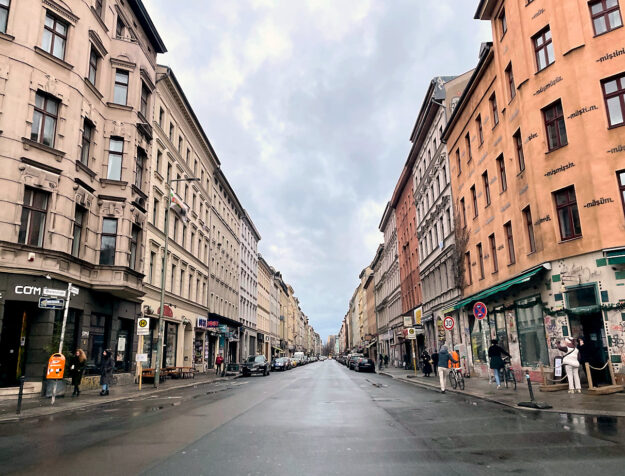Oranienstraße in Berlin’s Kreuzberg district is one of the city’s more legendary streets. For me personally, my first walk along Oranienstraße was a bit of a culture shock – and at the same time an epiphany: this is Kreuzberg – this is Berlin. That was in the mid-1980s – and I was a teenager at the time.
Today, Oranienstraße is probably one of the best-known streets in Kreuzberg. For many Berlin visitors, a walk along Oranienstraße, including a visit to one of the many bars, restaurants or snack bars, is a natural part of their Berlin program.
A walk along Oranienstraße
The eastern end of Oranienstraße is definitely a bit more exciting than the western end. Between Axel-Springer-Straße and Moritzplatz there are only a few cafés, pubs or stores. Nevertheless, I would recommend starting your walk right here – because this rather quiet corner also has some things you don’t want to miss.
On the opposite side of the intersection of Axel-Springer-Straße and Oranienstraße you will for example see ‘golden’ Axel-Springer highrise office building – a rather symbolic building – the center of power and the headquarters of the Axel Springer SE media group, closely linked to the history of the Berlin student revolt of 1968 and thus to the Berlin Left and Kreuzberg.
If you now walk east, you will first pass Waldeckpark, named after the politician Benedikt Waldeck (wikipedia).
At Moritzplatz
The Oranienstraße becomes a little livelier at Moritzplatz. This is where the Aufbau Haus (www.aufbauhaus.de) is located, which was reopened in 2011 after extensive renovation and extension work. The Aufbau Haus now houses various facilities and stores such as the specialist store Modulor. More about Moritzplatz.
Further east, you will now find various smaller and larger stores, pubs and galleries – for example the daad-Galerie and the Old-Berlin restaurant Max und Moritz.
At Oranienplatz, the street opens up on both sides. A former canal crosses here, which today connects the Böcklerpark at Landwehrkanal with the Engelbecken at Bethaniendamm as a narrow but longish park.
Further east, the Oranienstraße becomes increasingly lively. Small stores, snack shops, bars and pubs line the street. Halfway between Oranienplatz and Rio-Reiser-Platz (formerly Heinrichplatz), the Adalbertstraße crosses and you have a nice view towards Kotti and the Zentrum Kreuzberg, the building that spans Adalbertstraße.
A little further on is SO36 on the right – probably one of the most legendary venues Berlin has to offer. Originally a restaurant, later a movie theater, then a studio and supermarket, it has been a venue and concert hall since 1978.
Mariannenstraße crosses Rio-Reiser-Platz (formerly Heinrichplatz). Turn right towards Skalitzer Straße and continue to Kottbusser Brücke – left to Mariannenplatz with the Bethanien-Areal, which today houses studios, the Kunstraum Kreuzberg, a restaurant, the Georg-von-Rauch-haus and other facilities and institutions.
Shortly before Oranienstraße ends at Skalitzer Straße or turns into Wiener Straße, you will pass various other small, fine stores and restaurants – including the Headache Headshop and the record store Coretex Records.
Risk of confusion between Oranienstraße and Oranienburger Straße
Oranienstraße has been confused with Oranienburger Straße in the Mitte district.
The street was named after the Dutch royal house of Oranien.

